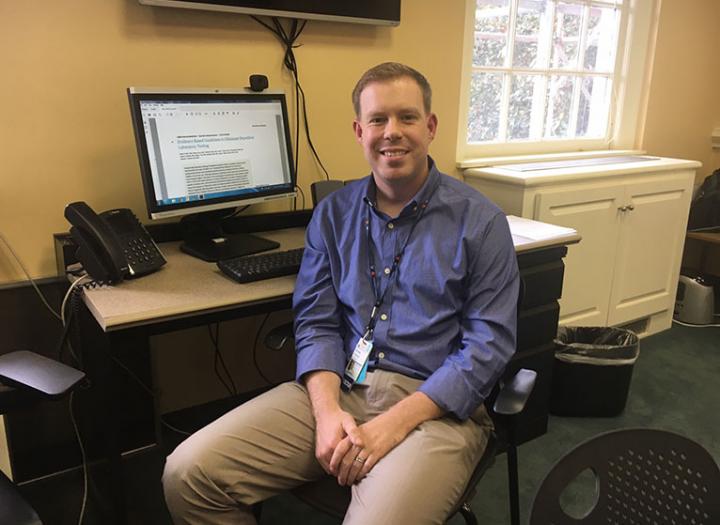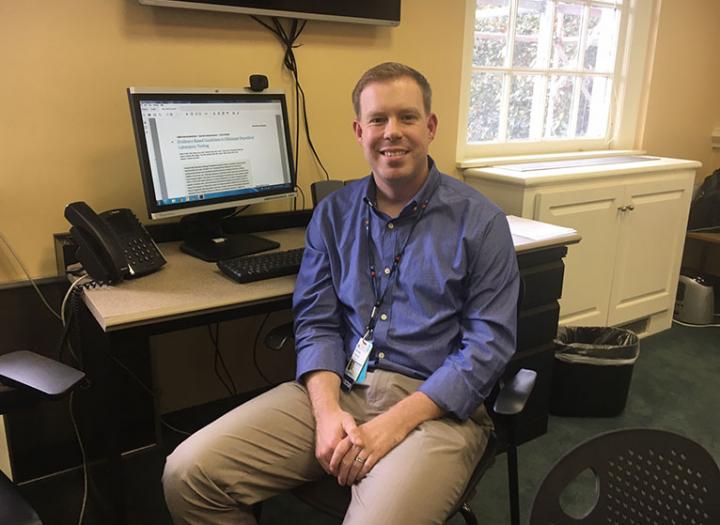
Credit: Josh Barney | UVA Health System
Researchers at top hospitals in the U.S. and Canada have developed an ambitious plan to eliminate unnecessary medical testing, with the goal of reducing medical bills while improving patient outcomes, safety and satisfaction.
The researchers are urging physicians and other care providers to reconsider the use of routine daily lab tests performed on hospitalized patients. Automatically performing such tests without determining they are important to the patient's treatment is a "wasteful clinical practice that threatens the value of healthcare," the researchers warn in a new paper published in JAMA Internal Medicine, a journal of the American Medical Association.
The researchers note, for example, that excessive blood testing can lead to hospital-acquired anemia, increase medical costs and generate additional unnecessary testing. It's also painful for the patients who find themselves frequently being stuck with a needle. "Despite strong evidence for the negative effects of routine daily laboratory testing on patients, there remains a need for improved implementation of this high-value measure," said the paper's senior author, Andrew Parsons, MD, MPH, of the University of Virginia School of Medicine. "Our aim is to assist other institutions that would like to promote this high-value practice as a quality-improvement effort."
A Strategy for Better Healthcare
The researchers note that there are many reasons for excessive testing, from fear of litigation to lack of knowledge of the costs involved. However, their paper suggests that there are simple ways for healthcare facilities to reduce unnecessary testing safely and without compromising the quality of patient care. Several previous studies have borne this out, they state. "Although reducing repetitive laboratory testing may bend the cost curve, patient safety should remain at the forefront of these efforts," the researchers wrote.
Their plan encourages healthcare facilities to:
Design and implement educational efforts to train care providers in better practices. Evidence should be provided that demonstrates the safety and effectiveness of those practices. This educational effort should range from bedside nurses all the way up through senior hospital leadership.
Audit testing and provide feedback to those ordering the tests. By giving healthcare providers real-time feedback on their ordering patterns, they can adjust those patterns to optimize care. Anonymized comparative data should be provided as well, the researchers urge.
Harness the power of electronic medical records to limit unnecessary testing. For example, hospitals might limit the ability to order repetitive daily labs on a perpetual basis.
Be Safe
The researchers' efforts align with the UVA Health System's Be Safe initiative, a groundbreaking program initiated by Richard M. Shannon, MD, UVA's executive vice president for health affairs. Be Safe aims to make UVA the safest hospital in America, and it does so, in part, by calling on all employees to develop and consistently adhere to best practices that put the patient first.
Parsons and George Hoke, MD, associate director of hospital medicine and faculty development, represent UVA on the High Value Practice Academic Alliance, a coalition of more than 80 academic medical centers working to improve healthcare by eliminating waste. The new paper represents the group's third such initiative. "Unlike traditional clinical practice guidelines that describe best-practice objectives, these papers are designed to guide medical centers through the process," Parsons said. "Each paper is being co-authored by experienced quality-improvement faculty from multiple academic medical centers that have safely reduced unnecessary practice."
###
The new guidelines were developed by experts at UVA, the University of Michigan, the University of Toronto, the University of Pennsylvania and Johns Hopkins University, as well as by residents in training.
Media Contact
Josh Barney
[email protected]
434-906-8864
http://www.healthsystem.virginia.edu/home.html
Related Journal Article
http://dx.doi.org/10.1001/jamainternmed.2017.5152





